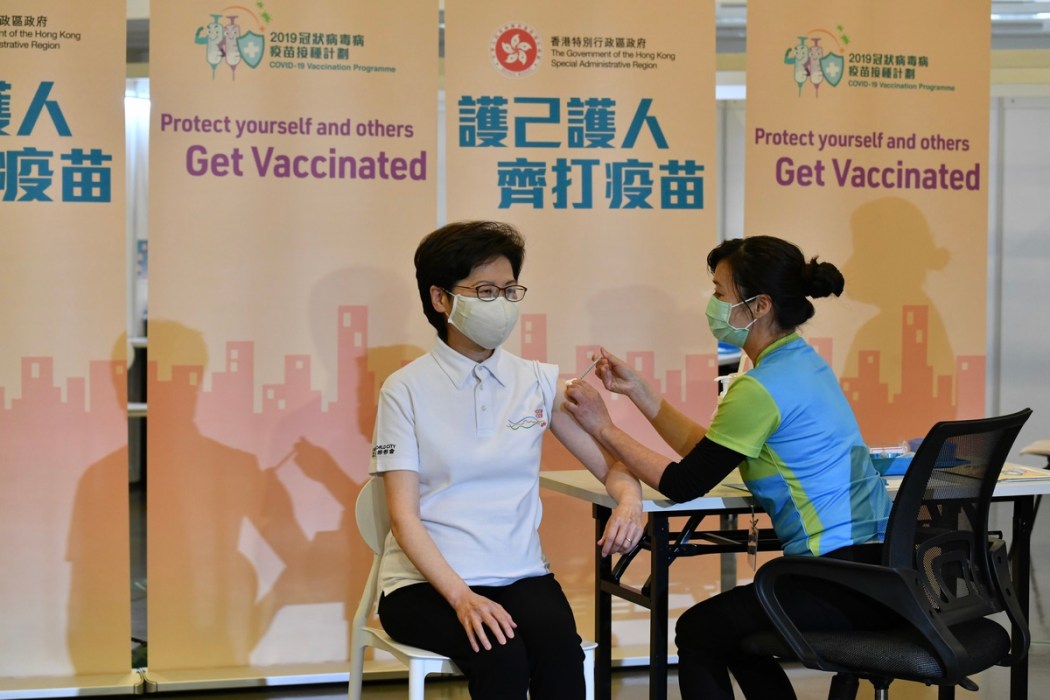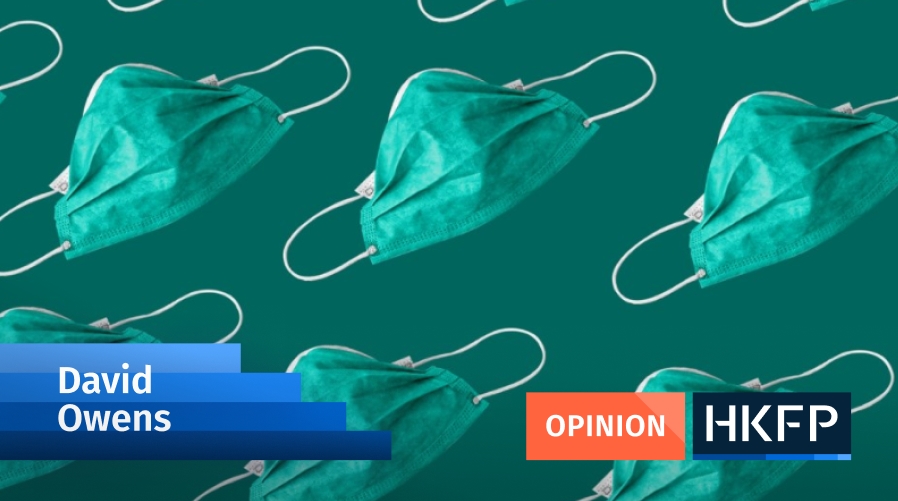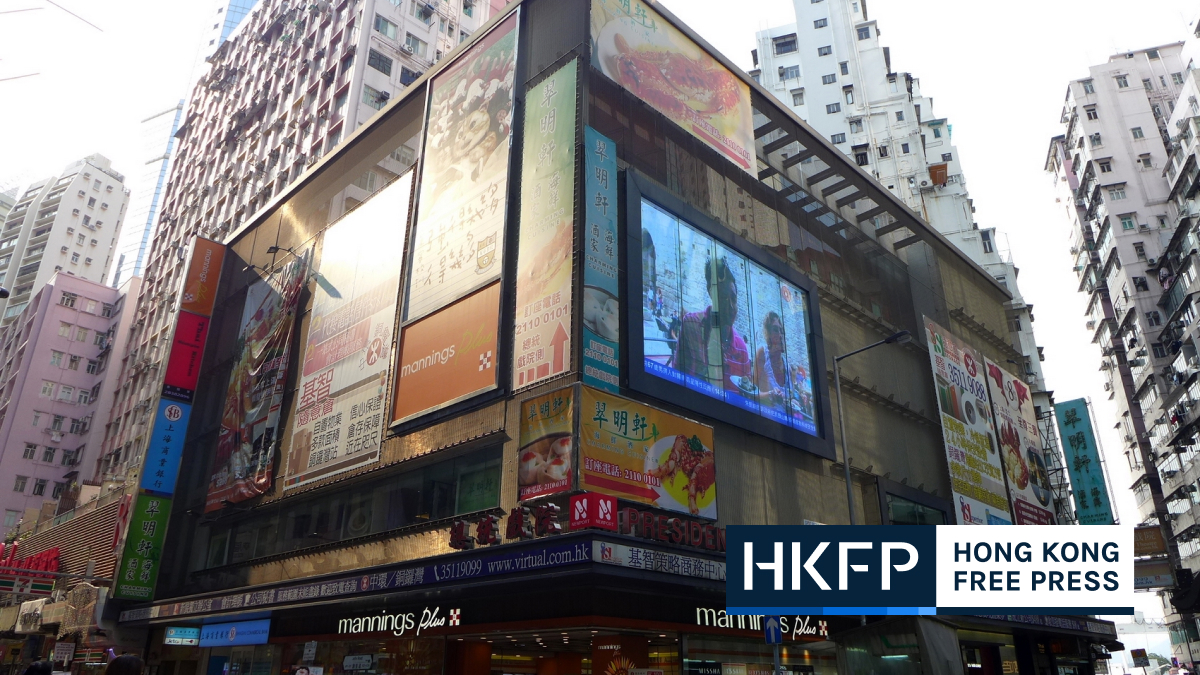By Sebastian Skov Andersen & Thomas Chan
Until this month Mo Devlin, a physical education teacher in his 50s, hadn’t so much as swallowed an Ibuprofen for the past few years. As a subscriber to the belief in keeping anything not created in the body out of the body, no one was more surprised than he to be writing an Instagram post about his first jab of the coronavirus vaccine.
Devlin said he took his shot for both altruistic and egoistic reasons: to help society at large get back on track and – as a runner – to be able to compete and race again. His reasons for posting about it were the same: to set a good example for others and to be seen by his peers as a responsible person.

“I’m one of those boring, uptight people that never take any drugs of any sort, you know – not for a cold, not for a headache, not for pain,” Devlin told HKFP. “Ultimately, everyone’s going to have to get the vaccine in order for society to get back to normal, and I think you may as well be a leader rather than a follower.”
“I just felt that, if I was going to do this, and if I was to claim that part of the reason I did this was to try and be a good role model and to help Hong Kong, then I had to put my hand up and say that I’ve taken this vaccine,” he said.

In recent months, the government has begun rolling out the vaccines to wider segments of the population, with inoculations now available at local centres to over 16.
With the wider availability, a trend has emerged on social media: selfies taken just after the jab. Some pose with their sleeves still rolled up, others keep them down, but common for all is the caption on the lines of “Got that 2nd jab in me,” often accompanied by a syringe emoji.

Some hold up pamphlets, flyers and stickers with information about the vaccine and its side-effects, and posts often include the hashtag “HKTwitterGetsVaxxed.” Scrolling through the posts under the hashtag, it is clear that it is disproportionately expatriates in Hong Kong who open up about their shots online, whereas locals seem to be keeping a lower profile.
Some users of the hashtag like to specify which version of the vaccine they received – but only a few mention the Chinese-made Sinovac that has attracted much scepticism from locals due to its origin, low efficacy rate, and a number of deaths following injection despite the lack of any proven link. Mentioning that you received Pfizer-BioNTech also appears to be a way of distancing oneself from the stigma associated with taking the government-recommended Sinovac.
And if anyone is keen – Ap Lei Chau’s vaccination centre has a pile of stickers, badges and masks to give out to those who are vaccinated. #HKTwitterGetsVaxxed pic.twitter.com/2bcg3CjLlF
— Denvy Lo 盧丹微 (@denvy) April 7, 2021
But behind those who bask in the glory of being publicly vaccinated are the many Hongkongers who prefer to keep their jab private. Some have even criticised the mainly expatriate trend for publicity, posing the question: where was all this goodwill when protesters were fighting for democracy in the streets?
“Really interesting to see the sheer amount of Hong Kong expats who have come out of the woodwork to talk about vaccines but were unseen or heard during the protests,” wrote one pro-democracy account popular among supporters of the movement on Twitter. “Noted.”
“Although I support vaccination, I still feel sour about the tag,” wrote another Hongkonger in a tweet.
As of Friday, the government has administered over 1.3 million doses, with 13.5 percent of the population having received one dose and 7 per cent fully vaccinated. Meanwhile, 26.6 per cent of those receiving their first dose were aged 39 or below.
Public health experts say that, though infection rates may currently be low, it is a good idea to receive the vaccine in order to achieve herd immunity and prevent future outbreaks and lockdowns.

Ben Cowling, professor at the University of Hong Kong’s School of Public Health, tweeted that while vaccines are effective in curbing the pandemic and will help relax public health measures, there is considerable vaccine hesitancy in the city.
He cited the low perceived risk of the pandemic, fear of side effects and lack of incentives as reasons.
Social stigma
A source who has been active in promoting the #HKTwitterGetsVaxxed hashtag, who preferred to remain unnamed due to harassment concerns, said she had experienced a backlash from some pro-democracy Hongkongers because of the hashtag. When it first became popular, some even alleged that it was secretly a government social media campaign to coerce critics into getting the vaccine.
While some consider the vaccine inherently political, others try to dissociate health from politics by claiming vaccination is not about compliance with government programmes but about the greater good.
“I do agree that it’s very easy for me as an expat, because I probably won’t spend the rest of my life here,” said Devlin. “So I have nothing but empathy for anyone whose short, medium, or long-term future and their children’s future is in Hong Kong, because there’s very real concern. But I’d like to see the fight for democracy be slightly separated from the benefits of everybody receiving the vaccine. The social and economic benefits of taking the vaccine affect everybody.”
Still, few in “yellow-ribbon” circles trust the government’s vaccination programmes without significant reservations due to the crackdowns in recent years, just like many refuse to take orders from the government. This has meant that some may have taken the vaccine but don’t like to admit it. Or that some may want to get jabbed but are deterred by the social stigma.

Johnny Jip is one of those people. He accepted the Pfizer vaccine and was pleasantly surprised by the process, which he found comfortable and safe. Despite his good experience, he chose not to post about it because he “didn’t think it was a very big issue.”
But he also felt wary about how others would react to the post, not necessarily publicly but internally. “At the same time, there are these social norms and I don’t want to be misunderstood,” he said. Snapping photos after taking part in a government programme would send the wrong message to his peers.
Chiman Cheung, who got the vaccine but chose not to post about it, said he respected a person’s right to make a decision without social pressure. He found vaccinations a private matter, and thought people would be able to make a decision on their own – whether or not others were posting about it online.
“For their self-image, they [posters] want to appear altruistic,” he said. “So it’s for more selfish reasons. They want people to know that they are taking the vaccine and that they are contributing to society.”
i was bothered by wisdom teeth recently. finally feeling ready to receive my first jab of @BioNTech_Group. truly amazed by the power of science. very smooth workflow, just 10 minutes plus 15 mins of resting time. #HKTwitterGetsVaxxed pic.twitter.com/yNG78Xqth2
— Hayes Luk (@hayesluk) April 22, 2021
He thought of the vaccine as a simple cost-benefit analysis, both taking it at all and whether to post about it, and for many locals the benefits simply didn’t outweigh the costs. Cheung himself only got jabbed in hopes of eventually travelling to the US again, where he has previously been a student. To many others, it just isn’t worth it, he said.
The risk of side-effects was seen as significant, even if they are often mild and swift, and with infection rates currently sitting at a minimum the need for vaccinations was small. Socially, he found it odd if people took the vaccine for a non-practical reason, seeing as he didn’t find it necessary in the current Covid situation.
Martin Guido, an events organiser in his 40s, said he had noticed a peculiar pattern when he talked to locals. People would not criticise him or his choice but rather start a discussion about the trustworthiness of the vaccination programme in general.
To Guido, posting his vaccination shot was about the greater good of the society. He rejected accusations of egoism, saying he initially felt reluctant to make a post but was inspired by his peers. Their posts had an effect on him which he would like to encourage in others – a sense of duty and pride about getting his shots rather than for reasons of vanity.
“I took a few cues that I view quite highly, and I saw the responsibility to convey a message that you’ve done something, and it should be helping the greater good of society,” he said.
The Canadian expatriate argued that while he never wanted to celebrate the fact that he took the vaccine, sharing his experience could help bring things back to normal. He understood that last year’s developments had politicised everything in the city but lamented that this had extended to the vaccine.
“It does really feel like there’s a large proportion of society that is immediately labelling social media posts, and then by default, or by connection, labelling people by the colour blue or yellow,” he said. “I think that is very disheartening. We’re all trying to get through this together.”
Guido wanted to overcome the controversy surrounding the vaccine and show that it is – in fact – a safe and responsible choice. But he acknowledged that it was easy to draw these conclusions when you are not a local and hold a lesser stake in the city’s politics.
“It should be inspiring more than dictating,” he said.
Support HKFP | Policies & Ethics | Error/typo? | Contact Us | Newsletter | Transparency & Annual Report | Apps
Help safeguard press freedom & keep HKFP free for all readers by supporting our team
















